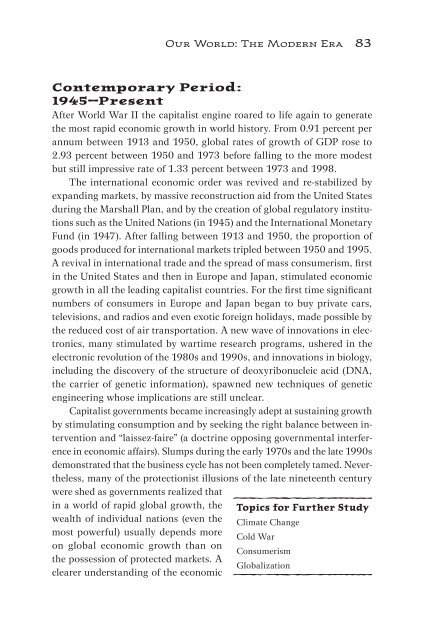This Fleeting World
This Fleeting World
This Fleeting World
You also want an ePaper? Increase the reach of your titles
YUMPU automatically turns print PDFs into web optimized ePapers that Google loves.
Our <strong>World</strong>: The Modern Era 83<br />
Contemporary Period:<br />
1945–Present<br />
After <strong>World</strong> War II the capitalist engine roared to life again to generate<br />
the most rapid economic growth in world history. From 0.91 percent per<br />
annum between 1913 and 1950, global rates of growth of GDP rose to<br />
2.93 percent between 1950 and 1973 before falling to the more modest<br />
but still impressive rate of 1.33 percent between 1973 and 1998.<br />
The international economic order was revived and re-stabilized by<br />
expanding markets, by massive reconstruction aid from the United States<br />
during the Marshall Plan, and by the creation of global regulatory institutions<br />
such as the United Nations (in 1945) and the International Monetary<br />
Fund (in 1947). After falling between 1913 and 1950, the proportion of<br />
goods produced for international markets tripled between 1950 and 1995.<br />
A revival in international trade and the spread of mass consumerism, first<br />
in the United States and then in Europe and Japan, stimulated economic<br />
growth in all the leading capitalist countries. For the first time significant<br />
numbers of consumers in Europe and Japan began to buy private cars,<br />
televisions, and radios and even exotic foreign holidays, made possible by<br />
the reduced cost of air transportation. A new wave of innovations in electronics,<br />
many stimulated by wartime research programs, ushered in the<br />
electronic revolution of the 1980s and 1990s, and innovations in biology,<br />
including the discovery of the structure of deoxyribonucleic acid (DNA,<br />
the carrier of genetic information), spawned new techniques of genetic<br />
engineering whose implications are still unclear.<br />
Capitalist governments became increasingly adept at sustaining growth<br />
by stimulating consumption and by seeking the right balance between intervention<br />
and “laissez-faire” (a doctrine opposing governmental interference<br />
in economic affairs). Slumps during the early 1970s and the late 1990s<br />
demonstrated that the business cycle has not been completely tamed. Nevertheless,<br />
many of the protectionist illusions of the late nineteenth century<br />
were shed as governments realized that<br />
in a world of rapid global growth, the<br />
wealth of individual nations (even the<br />
most powerful) usually depends more<br />
on global economic growth than on<br />
the possession of protected markets. A<br />
clearer understanding of the economic<br />
Topics for Further Study<br />
Climate Change<br />
Cold War<br />
Consumerism<br />
Globalization


